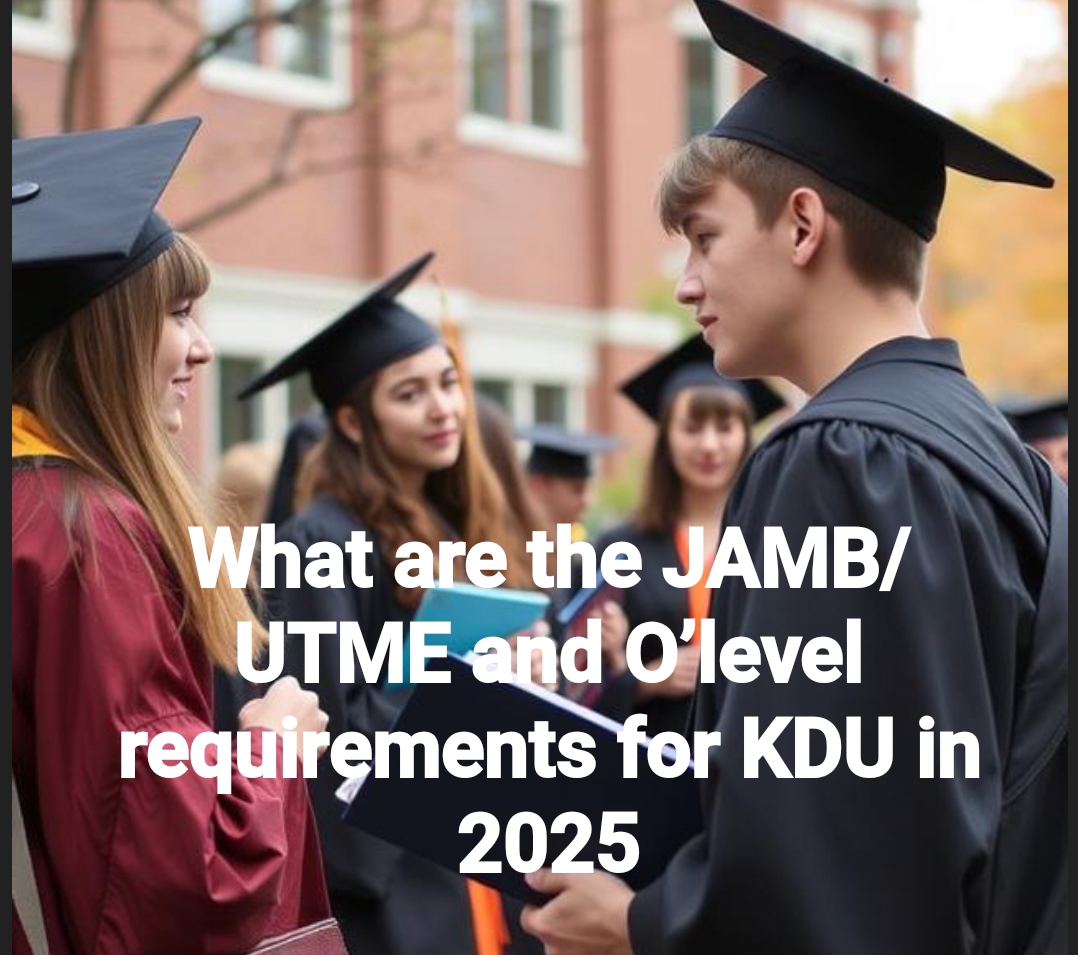What are the JAMB/UTME and O’level requirements for KDU in 2025

Thinking about studying at KDU (KolaDaisi University) in 2025? You’re not alone! Every year, thousands of students just like you search for the right admission requirements, hoping to secure a spot in this prestigious institution. But let’s be honest—figuring out JAMB/UTME cutoffs, O’level subject combinations, and other admission details can feel overwhelming, especially when information keeps changing.
I remember when I was researching university requirements a few years ago—endless Google searches, confusing forum threads, and even conflicting advice from well-meaning friends. It was frustrating! That’s why I decided to break down the 2025 JAMB/UTME and O’level requirements for KDU in the simplest way possible, so you don’t have to stress like I did.
Whether you’re a fresh secondary school graduate or considering a transfer, knowing the exact admission criteria is the first step to avoiding unnecessary setbacks. Did you know that some students miss out on their dream courses simply because they didn’t meet the right subject combinations? Or that others assume their JAMB score is enough, only to realize later that their O’level grades matter just as much?
In this guide, we’ll walk through everything you need—from the latest JAMB cutoffs for your preferred course to the specific WAEC, NECO, or NABTEB grades required. No fluff, no guesswork—just clear, up-to-date information to help you prepare properly
What Are the JAMB/UTME and O’Level Requirements for KDU in 2025?
If you’re aiming to secure admission into KolaDaisi University (KDU) in 2025, understanding the JAMB/UTME and O’Level requirements is crucial. Trust me, I’ve seen too many students miss out on their dream courses simply because they didn’t meet the right criteria—don’t let that be you!
JAMB/UTME Requirements for KDU (2025)
First things first, you’ll need to sit for the UTME exam and select KDU as your preferred choice. The general JAMB cutoff mark for KDU is 160, but some competitive courses like Medicine, Law, and Engineering may require higher scores (180+).
A friend of mine once assumed 160 was enough for Accounting, only to realize later that the department had raised their cutoff to 170 that year. Lesson learned—always check the latest updates from the school or your desired department to avoid surprises.
O’Level Subject Combinations
Your WAEC, NECO, or NABTEB results are just as important as your JAMB score. Here’s what you need:
- You’ll need credits in five key subjects (with English and Math being mandatory for nearly all programs).
- “A minimum of five credit passes is required, and English Language plus Mathematics are compulsory for the majority of courses.
- “Scoring credits in five O’Level subjects is essential—with English and Math being non-negotiable for most degree programs.
- “Five solid credits are mandatory, and for almost every course, English and Mathematics must be among them.
- “Your O’Level results must show at least five credits, and in most cases, English and Math cannot be left out.
- Science-based programs (like Biochemistry or Computer Science) usually require credits in Physics, Chemistry, and Biology.
- Arts and Social Science courses may accept subjects like Economics, Government, or Literature.
I remember a student who had strong JAMB scores but missed admission because she didn’t have a credit in Mathematics—a core requirement for her chosen course. Double-check your O’Level subjects before applying!
Direct Entry (DE) Requirements
If you’re applying through Direct Entry, you’ll need:
- A minimum of two A’Level passes (JUPEB, ND, NCE, or equivalent).
- A good O’Level result (same as UTME candidates).
Final Tips for a Smooth Admission Process
- Confirm your course requirements on KDU’s official website—some departments have special conditions.
- Apply early to avoid last-minute errors or delays.
- Prepare all documents (JAMB result slip, O’Level certificates, birth certificate, etc.) ahead of time
Does KDU accept second-choice candidate
The Straight Answer: Yes, But With Conditions
Good news! KDU does consider second-choice applicants, but there’s a catch. Like most universities, they prioritize first-choice candidates during admission. However, if slots remain unfilled (which sometimes happens in less competitive courses), second-choice applicants get a chance.
A friend who applied for Mass Communication as her second choice was pleasantly surprised when she received an admission offer after the first batch of lists dropped. Her advice? “Always monitor the admission portal closely, even if you’re second choice
How does KDU’s post-UTME screening work?
If you’re preparing for KolaDaisi University’s post-UTME screening, you’re probably feeling that mix of excitement and nerves – I remember sweating through mine two years ago, unsure what to expect. Let me walk you through exactly how it works so you can walk in (or log in) with confidence.
The Digital Screening Process
Unlike some universities that still do physical screenings, KDU conducts its post-UTME entirely online via a computer-based platform. Here’s how it typically unfolds:
- Registration Phase
- You’ll receive an email/SMS notification once the portal opens (pro tip: check your spam folder!)
- Upload required documents: O’level results, JAMB result slip, birth certificate
- Pay the screening fee (exact amount changes yearly)
- The Actual Screening
- It’s not a traditional exam – more of a document verification and aptitude assessment
- You’ll answer questions about your chosen course and general knowledge
- Duration is usually 45-60 minutes (set up in a quiet space with stable internet)
A friend almost missed hers because she assumed it would be physical – she was scrambling to find a cybercafe 30 minutes before deadline!
What Makes KDU’s System Unique?
- No technical nightmares: Their platform is surprisingly user-friendly compared to other schools
- Flexible timing: You typically get a 3-5 day window to complete it
- Instant acknowledgment: You’ll usually get a confirmation message immediately after submission
Common Mistakes to Avoid
- Rushing through questions: The timer causes panic, but read each question carefully
- Poor document quality: Scan your certificates clearly – blurred uploads cause delays
- Last-minute submissions: Technical glitches love deadline day!
After Submission
Results usually appear on your portal within 7-10 days. If you don’t see yours by then, don’t panic – just contact admissions with your details.
Proven Tip: Candidates who score above 60% in screening significantly boost their admission chances, even with average UTME scores
What is the admission deadline for 2025/2026
Official KDU 2025/2026 Admission Timeline
For most undergraduate programs, KDU typically follows this annual pattern:
- UTME Application Deadline: January/February 2026 (exact date varies yearly)
- Post-UTME Screening: Usually concludes by March
- Admission List Releases: Staggered batches from April through July
But here’s what most applicants don’t realize – these deadlines aren’t set in stone. Last year, the management extended the deadline by two weeks due to technical issues many students faced with document uploads. However, banking on an extension is risky – treat the initial date as final.
3 Critical Deadlines You Must Track
- JAMB Change of Institution (if switching to KDU as first choice)
- Post-UTME Registration (often closes 1-2 weeks after UTME deadline)
- Document Verification (even after submitting, incomplete files can disqualify you)
A current 200-level student shared with me: “I submitted my application on the ‘final day’, but later discovered some departments had earlier internal cutoffs. Always apply at least 3 weeks before the stated deadline!”



